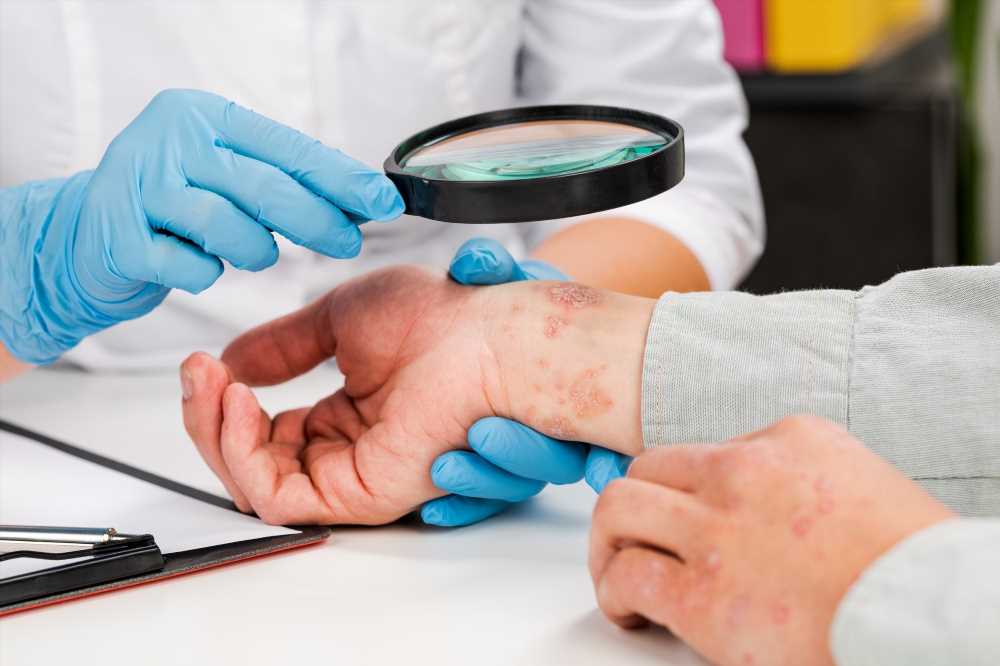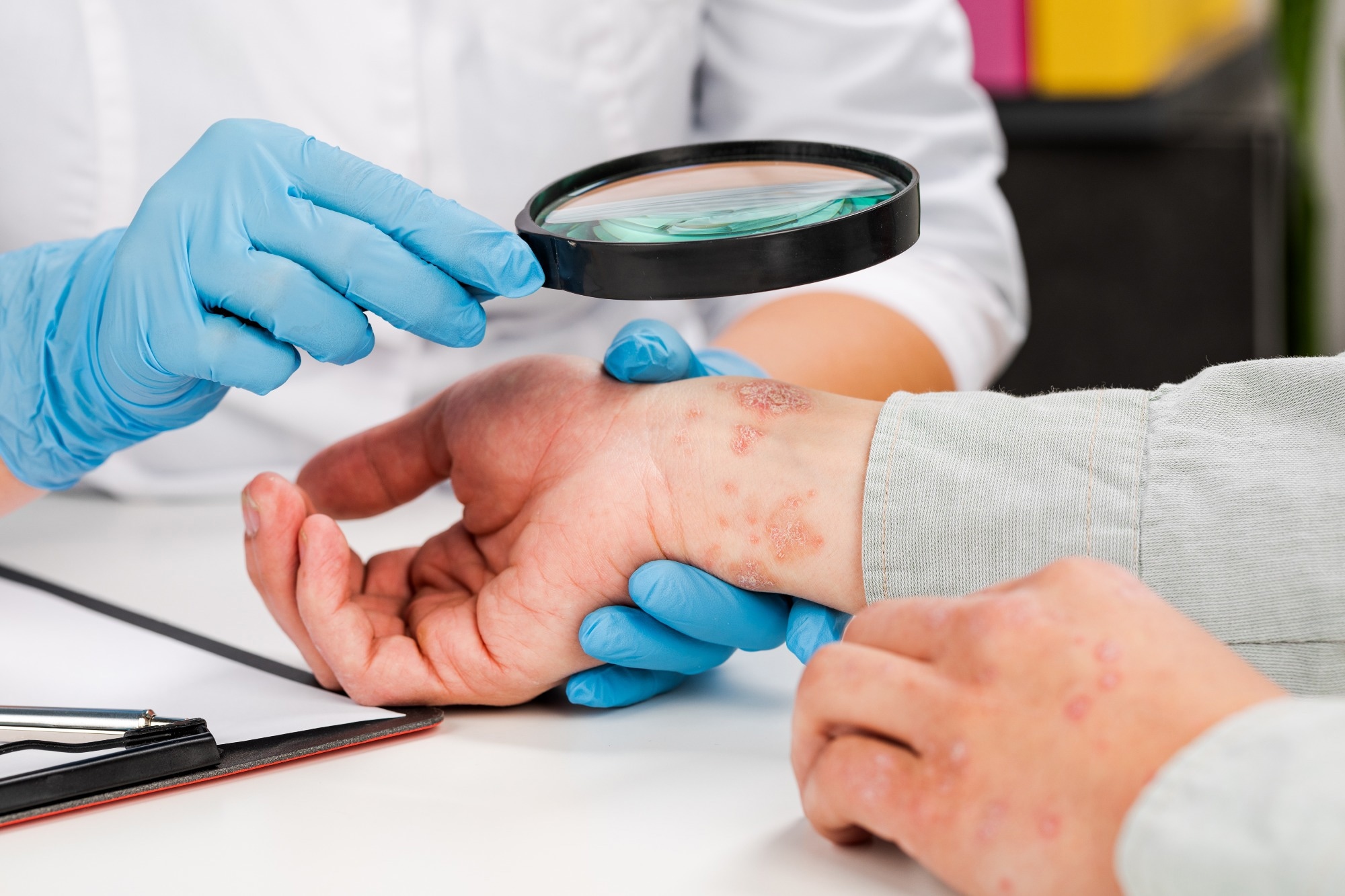Psoriasis vs. atopic dermatitis: New study reveals surprising inflammatory differences in age-specific groups

In a cross-sectional study published in the Medicina Journal, researchers from Montenegro and Serbia compared the hematological parameters and serum biomarkers of inflammation and immunity in patients with atopic dermatitis (AD) and psoriasis (PsO).
They found a higher pro-inflammatory state in AD vs. PsO in age-specific groups and a higher pro-inflammatory state in patients with comorbidities for both conditions.
 Study: Comparative Study of Hematological Parameters and Biomarkers of Immunity and Inflammation in Patients with Psoriasis and Atopic Dermatitis. Image Credit: Fuss Sergey/Shutterstock.com
Study: Comparative Study of Hematological Parameters and Biomarkers of Immunity and Inflammation in Patients with Psoriasis and Atopic Dermatitis. Image Credit: Fuss Sergey/Shutterstock.com
Background
An imbalance in molecules that regulate inflammation is known to be associated with chronic skin ailments such as PsO and AD.
The scarcity of studies evaluating the serum biomarkers of inflammation and immunity and the absence of studies comparing the hematological parameters in patients with these conditions calls for more research in the field to improve our understanding of the pathophysiology of PsO and AD.
About the study
In this cross-sectional study, overnight fasting blood samples were collected from 40 patients with PsO and an equal number of patients with AD.
The study did not include patients receiving biologic therapy or those with other skin diseases, malignancies, mental disorders, stroke, pregnancy, or a C-reactive protein level above 10 mg/L.
To measure hematological parameters, a complete blood cell count was performed, and various indices were calculated, including neutrophil-to-lymphocyte ratio (NLR), plateletcrit (PCT), platelets to lymphocytes ratio (PLR), red cell distribution width/platelets ratio (RPR), and mean platelet volume/platelets ratio (MPR).
A Sysmex XN-1000 analyzer was used to determine hematological parameters. Additionally, assays such as enzyme-linked immunosorbent commercial assay (ELISA) were used to determine serum biomarkers of immunity and inflammation, namely interferon-gamma (IFN-γ), interleukin (IL)-22, and C-reactive protein (CRP).
About ~50% of the patients in each group had comorbidities, including type 2 diabetes mellitus, hypertension, and asthma. Of the 40 patients in each group, 22 patients in the AD group and 18 in the PsO group were women.
Age-specific subgroups were created for statistical analysis in both PsO and AD groups, with patients above and below 50 years. Statistical analyses were conducted using the SPSS statistical package while data analysis was performed using the Shapiro-Wilk, Kruskal-Wallis, Mann-Whitney U, and chi-square tests.
Results and discussion
Other than the mean corpuscular volume (MCV), which was significantly higher in PsO vs. AD (p = 0.04), hematological parameters were not found to be significantly different in the two patient groups.
Further, the biomarkers for immunity and inflammation were not significantly different in PsO and AD. However, when age-specific statistical analysis was performed, NLR and IL-22 values of the two groups showed a significant difference.
In patients above 50 years, NLR was found to be higher for AD as compared to PsO. Similarly, in patients below 50 years, higher levels of IL-22 were found in AD compared to PsO. Within the AD group, the patients above 50 showed significantly lower IL-22 values than those below 50.
In PsO patients with comorbidities, significantly lower platelets, PCT, and PLR were observed, in addition to increased lymphocytes, RPR, and MPR, compared to patients without comorbidities.
In patients with AD and comorbidities, a low PCT, low PLR, and high RPR were observed compared to AD patients without comorbidities.
The findings of this study corroborate with previous studies that did not find a difference in the IFN-γ levels in both skin conditions. They also report no correlation between the studied parameters and the psoriasis area and severity index (PASI) score, as observed in certain other studies.
While it is established that neutrophils play a role in immuno-inflammatory processes, the role of platelets in regulating immuno-inflammatory processes is still unclear.
Higher RPR and MPR, indices of erythrocyte and platelet activation investigated in this study, suggest a role for cardiometabolic-related inflammation in both PsO and AD.
“A higher pro-inflammatory state (as reflected by platelet indexes) was found in both diseases with comorbidities.”
Conclusion
This work is the first to have extensively investigated and compared hematological parameters in patients with PsO and AD. It is also the first to explore RPR and MPR in PsO and AD. Of all the hematological parameters studied, a significant difference was only observed in MCV.
Among the serum biomarkers for immunity and inflammation, higher NLR and IL-22 levels in AD vs. PsO in age-specific groups indicate a greater pro-inflammatory state in these patients.
As per the findings, comorbidities could increase the cardiometabolic burden on these patients. The observed differences in these parameters could have implications for treating these conditions, especially in monitoring disease activity and response to therapy.
Identifying patients with an increased inflammatory response and continuing the search for biomarkers that most accurately reflect the severity of these conditions could help control them better.
Further research is needed to confirm these observations and explore their clinical implications.
-
Bakic, M., Klisic, A. and Karanikolic, V. (2023) "Comparative Study of Hematological Parameters and Biomarkers of Immunity and Inflammation in Patients with Psoriasis and Atopic Dermatitis", Medicina, 59(9), p. 1622. doi: 10.3390/medicina59091622. https://www.mdpi.com/1648-9144/59/9/1622
Posted in: Medical Science News | Medical Research News | Medical Condition News | Disease/Infection News
Tags: Assay, Asthma, Atopic Dermatitis, Blood, Cardiometabolic, Cell, Chronic, C-Reactive Protein, Dermatitis, Diabetes, Diabetes Mellitus, ELISA, Enzyme, Fasting, immunity, Inflammation, Interferon, Interferon-gamma, Interleukin, Lymphocyte, Neutrophils, Pathophysiology, Platelet, Platelets, Pregnancy, Protein, Psoriasis, Research, Skin, Stroke, Type 2 Diabetes

Written by
Susha Cheriyedath
Susha has a Bachelor of Science (B.Sc.) degree in Chemistry and Master of Science (M.Sc) degree in Biochemistry from the University of Calicut, India. She always had a keen interest in medical and health science. As part of her masters degree, she specialized in Biochemistry, with an emphasis on Microbiology, Physiology, Biotechnology, and Nutrition. In her spare time, she loves to cook up a storm in the kitchen with her super-messy baking experiments.